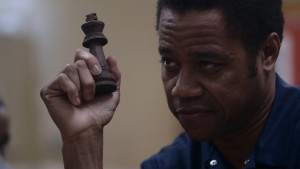These are muddy waters. Oops. Is that a white micro-aggression? Who gives a damn. I’ve noticed that black people rarely get Oscars except when they’re playing roles that are about being black. That sucks and it’s a kind of racism they have every right to object to. That said, there’s a kind of movie I watch — dare I say it? — religiously. The kind of movie with a predominantly black cast that’s about inspiring young black people to challenge themselves intellectually and achieve.
These movies almost always bring a tear to my eye. I live in a predominantly black town and most of what I see is hopelessness. My wife grew up elsewhere and doesn’t fully comprehend my complicated relationship with my hometown. “Don’t tell me you’re crying again,” she says. “Yes,” I tell her defiantly. “I want these hopes to come true.”
Here are the movies that make me cheer and hope and weep. I’ll have something to say about the lot at the end of this post.
They’re not all great movies. I fault the Great Debaters in particular because of a giant missed opportunity. In every single debate shown, the underdog kids were arguing the proposition they would be expected to advocate. Not how debate works. I so yearned to see them clean the clock of an Ivy team by winning an argument against their own expected belief system.
But it doesn’t matter in the end. What’s common to these movies is reinforcement of the idea that intellectual aspiration and achievement are the birthright of blacks as well as whites. I find it fascinating that notoriously lefty Samuel Jackson stars in the hardest of this small list of movies because it’s the one that touches on the third rail of black school experience, basketball. I understand his political rage, but I also admire his commitment to intellectual ambition as the way out of a dark place. He went to Morehouse College. He’s a highly educated man. And when he makes movies like these, he’s not doing it for the money. He’s doing it for love.
Up top, I told you I had changed up my mind. Not about race. About chess. I have always always hated chess. Hated the game itself since my brilliant grandfather taught me the moves of the individual pieces and confessed that he, too, didn’t quite see the point. Call it a bias, a prejudice, an irrational aversion. Always ticked me off that there are three categories in which prodigies appear at an impossibly early age: math, music, and chess. I get the first two. But why chess?
I had a friend in college who got higher SAT scores than I did, but he was black and couldn’t get into the clubs, even though he was a Grottlesex classmate of my well connected roommate. He didn’t want into the clubs, though. He wanted to play chess. I told him I was no good, knew nothing more than the mechanics of the moves, but he didn’t believe me until we played a game. When he said, “Oh. You weren’t kidding. You’re not any good.” He was so disappointed. Me too.
I failed him. Maybe that was part of my building resentment about the easy Hollywood meme that you can tell a brilliant black guy because he’s so good at — what? — chess.
Why the best movie on this list is “Life of a King.” First time I ever understood the meaning of chess as an agent of education. How shallow is that? The biggest learning point of the game I’d ever taken was the knowledge that Napoleon won at chess by cheating. Made it seem to excuse my own indolence and indifference in the easiest way possible. This movie makes it clear that “not cheating” is the whole point. Which includes understanding that the only important position on the board is the King, however you conceive him.
He is the principle you are willing to fight and sacrifice yourself for. He is the measure of your measure as a person. Are you a pawn, a knight, a bishop, a rook, a queen? And by all means, see the whole board, the long game, the end game.
None of this ever occurred to me. My bad. Why some movies are better than other movies. Watch these ones. You won’t be sorry.

